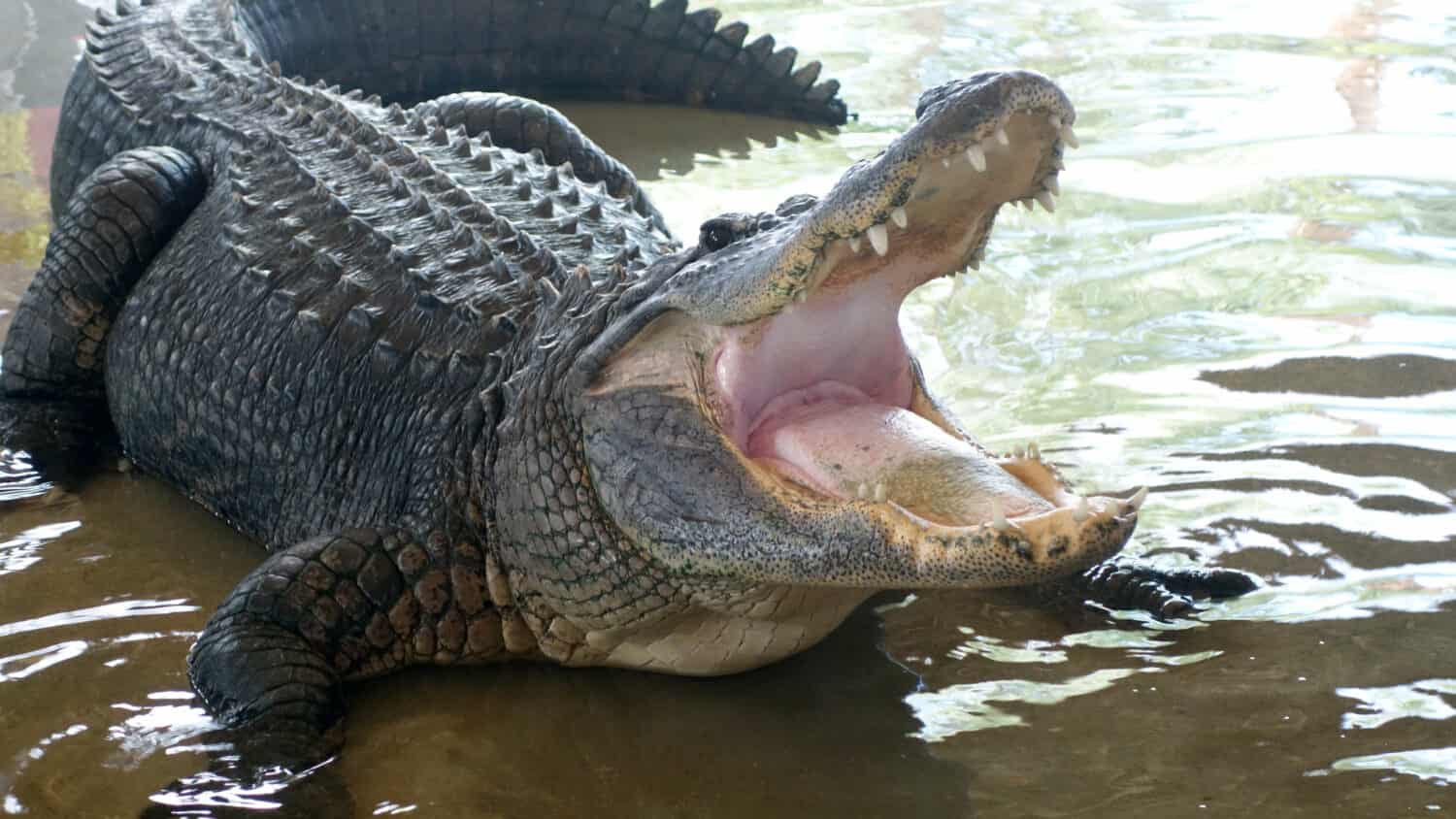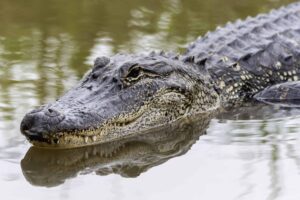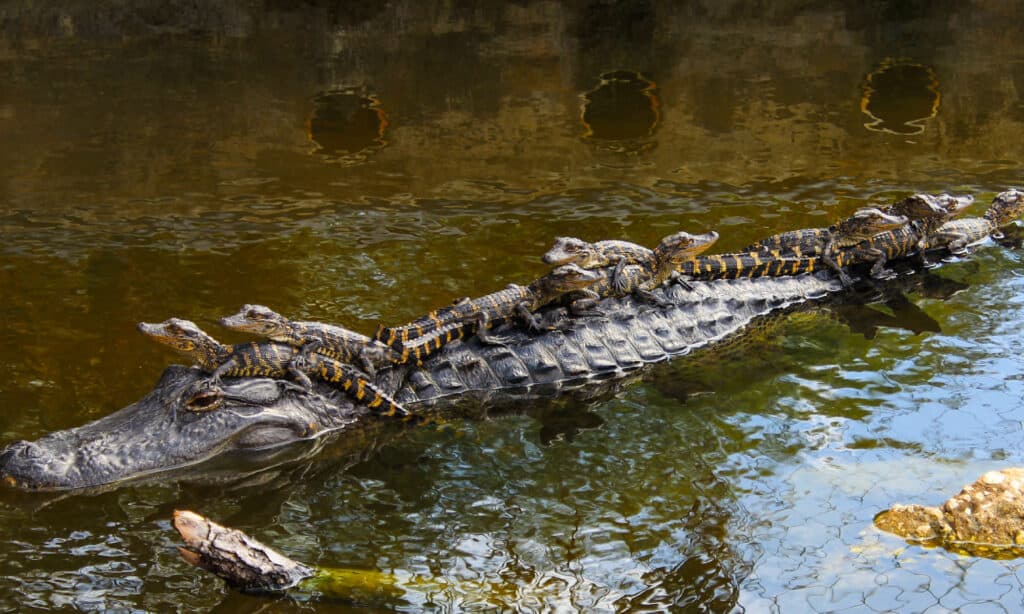
Mother alligators are protective, bellowing to their younglings to comfort them and keep them safe.
©Marc Pletcher/Shutterstock.com
Alligators are fascinating creatures that have been living on Earth for thousands of years. Their ancient ancestors were behemoths, towering over modern man and capable of swallowing one whole. Over time, they evolved to shrink to smaller sizes and feed on interchangeable small and large prey.
Unknown to most people, alligators are very vocal animals. Alligators may look angry and unexpressive; they have multiple ways of communicating their feelings and emotions.
This article highlights several ways alligators communicate with each other and how they manage to bellow deeply.
What Sounds Do Alligators Make?
Primarily, alligators have three different types of sounds.
- Hatchlings and young alligators make a chirping sound similar to birds.
- Mature alligators bellow and hiss to convey a range of emotions and communicate their intentions.
- Alligators also make a strong chomping sound by biting the water as a show of force or attempt to scare off anyone who ventures too close.
How Do Alligators Bellow?
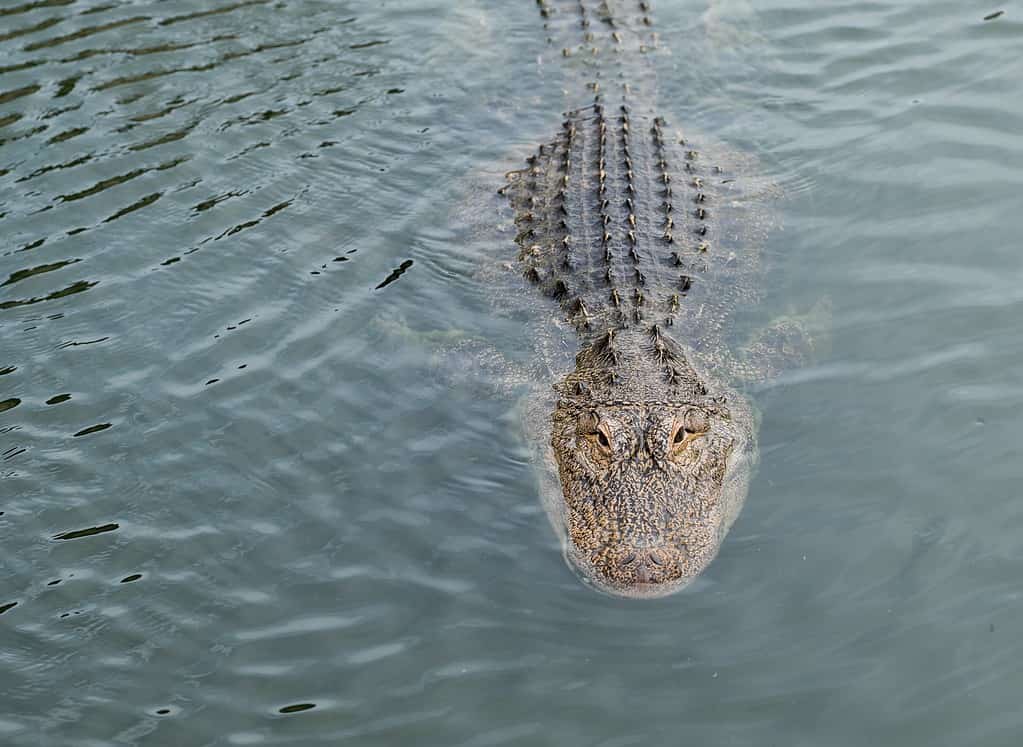
Mature alligators can spend 45 minutes underwater before surfacing for air due to large lung capacity.
©David Louis Tiffany/Shutterstock.com
Alligators spend large amounts of time in the water or near water. A fully-grown alligator can hold their breath for approximately 45 minutes before needing to surface. Some gators can stay underwater longer depending on their age, size, and temperature of the water.
First, alligators use their strong lungs to take in deep amounts of air to fill their lungs.
Next, they funnel the air through their bronchial tubes, larynxes, and glottis to manipulate the air through the lungs and mouth. The glottis is a flap in an alligator’s throat that blocks water from entering their mouth while they feed on fish underwater. It is common for alligators to use this flap while they rest in the water with their mouth open.
Finally, the air is released through their long snout to sound like a deep and hollow growl. The longer the air is drawn out from the lungs, the longer their bellow will last.
Larger alligators will produce deeper and longer bellows because of their immense size and bigger lung capacity.
Reasons Why Alligators Bellow
Alligator bellows are a natural form of communication between them and other gators or animals in the area. The range and frequency of the bellows will vary depending on the size of the gator and the intention of communication.
Rival Disputes
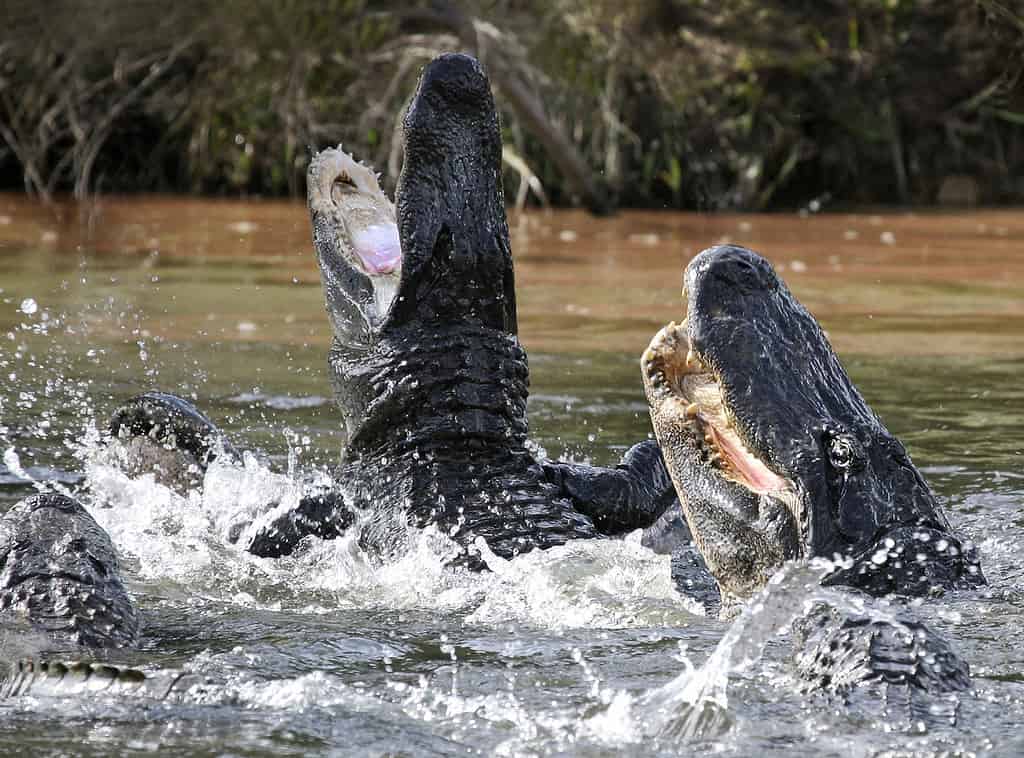
Alligators are very territorial and will fight each other for lounging space, food, or mating rights.
©© mark higgins/iStock via Getty Images
Alligators are highly territorial animals and will attack anything that enters their space. Bellowing is a dominance and threat display to chase off smaller and weaker males. Smaller gators may not always listen and will combat larger gators, but communication is the first sign of the conflict.
Larger alligators have a longer and deeper bellow, informing rivals of their size and ferocity if they continue to intrude.
Bellowing between rivals is much lower than mating season bellowing. These sounds are harder to distinguish as they go through the water at a lower frequency. Aquatic life such as turtles, amphibians, fish, and birds recognize these sounds and back away when two rivals are about to engage.
Mating Season
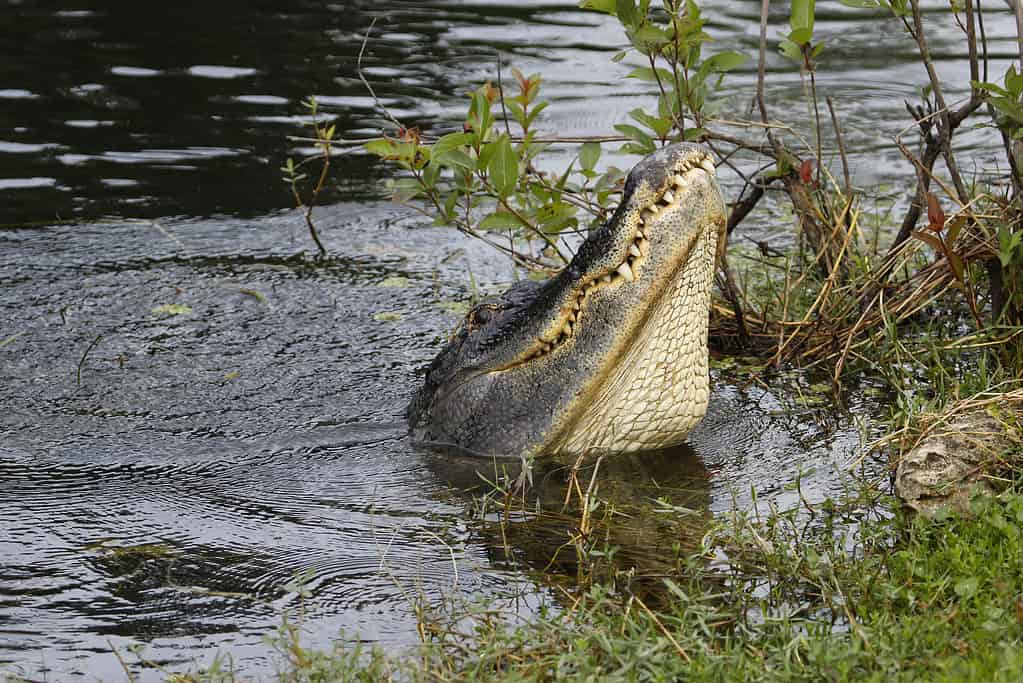
Alligators perform a courtship ritual called the “water dance” to attract females.
©Donyanedomam/iStock via Getty Images
The most common time to hear and see alligators bellow is during mating season. Alligator mating season takes place between May and June, but courtship can start as early as April.
Female alligators will only mate with alligators larger than herself. Males will compete against rivals to get the attention of a female to reproduce.
Male alligators perform a courtship ritual called the “water dance” where they submerge their bodies while leaving their head and tail exposed to the water. Next, they fill their lungs with air and release the air through their body to create a long, deep, and echoing bellow. As the alligator bellows, the air vibrates the water along their back, causing the water to jump like it is dancing.
The air vibrates at such a frequency that humans are unable to detect it without specialized equipment.
Females Protecting Offspring
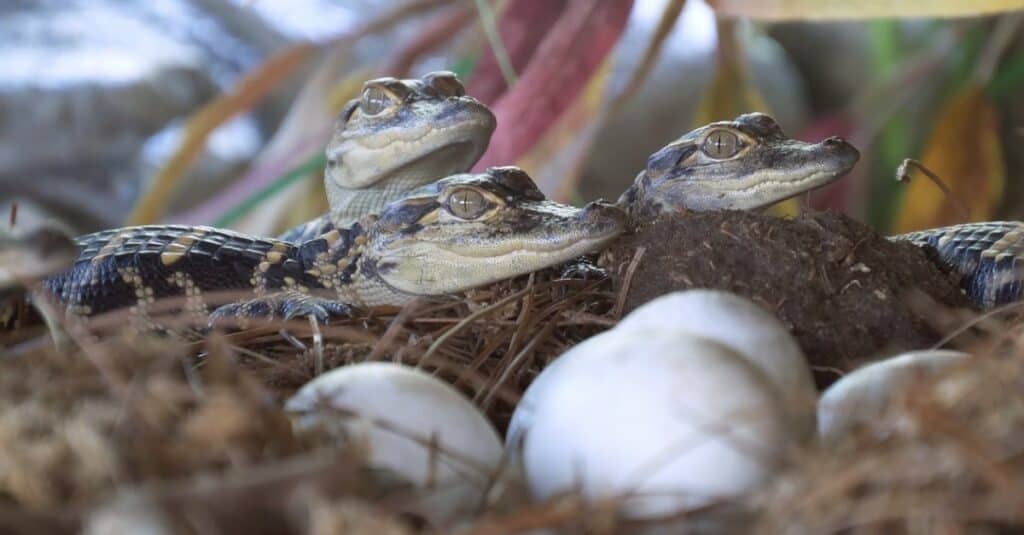
Alligator hatchlings are vulnerable to many predators like birds, raccoons, and other alligators.
©DimaSid/Shutterstock.com
After mating season, mother alligators will lay a clutch of approximately 30-50 eggs and bury them in foliage. She patrols the area protecting her clutch from predators like males seeking an easy meal. Mother alligators release a strong bellow to deter other gators from coming too close to her nest.
She also releases a bellow to comfort and call her hatchlings when they are nearby. This informs the younglings where their mother is for protection, as well as teaches them how to mimic her sounds when they are ready to start living on their own.
Why Do Alligators Hiss?
Hissing is a universal sign of aggression and for anyone on the receiving end to get away. Alligators hiss by taking in air and forcefully releasing it through their glottis. The hissing sound is very similar to other animals like snakes and cats.
Alligators may hiss at rival gators when bellowing does not work, or at larger prey that is intruding in their area that does not understand their bellows. A hissing alligator is a sign to leave the area immediately as they are ready to strike if the situation continues.
Hissing can be modulated to be steady and drawn to as a warning of their presence in the area. It can also be modified to sound harsher and more violent as more air is expelled quickly through the glottis.
Alligators will often snap their jaws or perform a false charge while hissing to chase away predators or intruders in their territory. A false charge is a lunging strike at a predator or intruder that is not meant to hit the target but to scare them away. A combination of hissing and snapping jaws is often more than enough to chase away threats.
Why Do Gators Chirp?
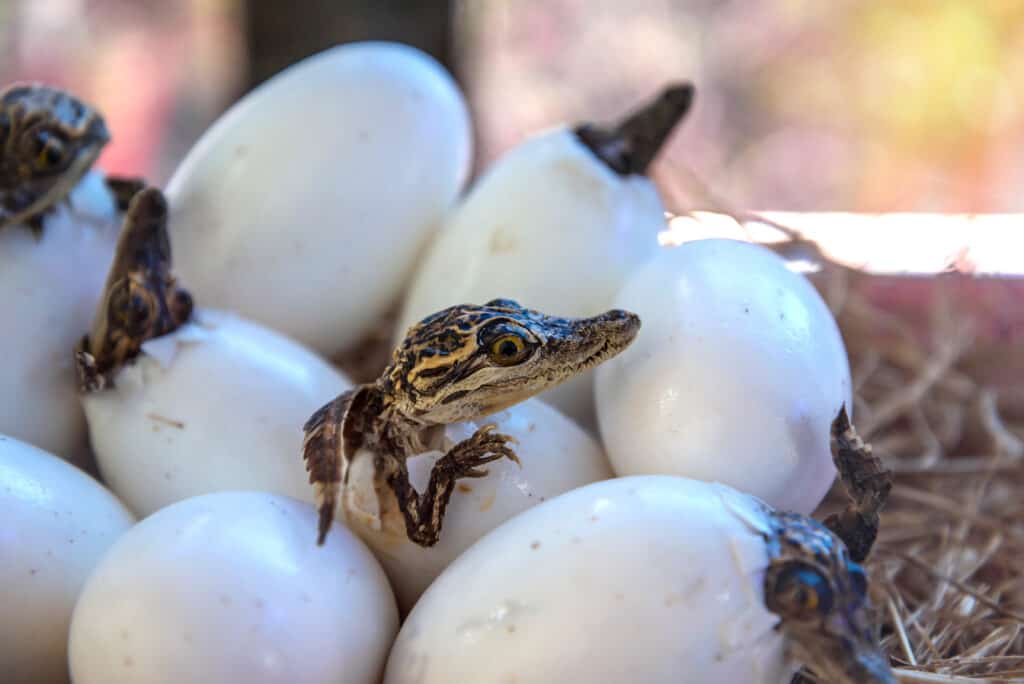
Young alligators make chirping sounds like birds to call their mother for protection and food.
©iStock.com/Casanowe
The idea of alligators chirping sounds very amusing because it is a unique form of communication for reptiles. Mature alligators do not chirp because they are large enough to scare off predators or unwanted rivals. Hatchling alligators and juveniles will chirp to communicate with their mother.
Hatchling alligators incubate in their eggs for approximately 65 days. Then, they will start breaking through their shells and chirp in their nest to alert their mother they are hungry and vulnerable.
Mother alligators are never too far away from their nest and will quickly return to the nest when she hears the high-pitched sound of hatchling chirps.
Hatchlings also chirp to each other to communicate they have found food or fight over spaces to sunbathe.
What To Do When Hearing Alligator Sounds
It is an incredible experience to listen to alligator sounds first-hand in the wild. However, it is also extremely dangerous to be near these animals whether they are making sounds or not.
An alligator making sound puts humans in a better position to escape since you can find where the sound is coming from and go in the opposite direction. A quiet alligator is a predator on the hunt and poses a high risk of injury if not wary.
Follow these tips on how to proceed when hearing alligator sounds:
- Bellow: First, find the source of the bellowing alligator. Look in the water and shoreline to spot any vibrating water. When the alligator has been spotted, calmly leave the area in the opposite direction.
- Hissing: First, stop all movement and survey the situation. Locate the source of the hissing and pinpoint exactly where the alligator is and potentially if there is a nest nearby. After locating the hissing alligator and/or nest, slowly retrace your steps and remove yourself from the area.
- Chirping: Although it is enticing to see hatchling alligators, it is very unsafe as the mother will be nearby. Leave the area immediately and avoid returning to that location for several weeks, as the hatchlings need time to grow up.
Surprisingly, alligators are very vocal animals that use many types of sounds, body language, and expressions to convey their feelings and intentions. If you happen to hear any alligator sounds, it is best to leave these large reptiles alone.
Thank you for reading! Have some feedback for us? Contact the AZ Animals editorial team.

